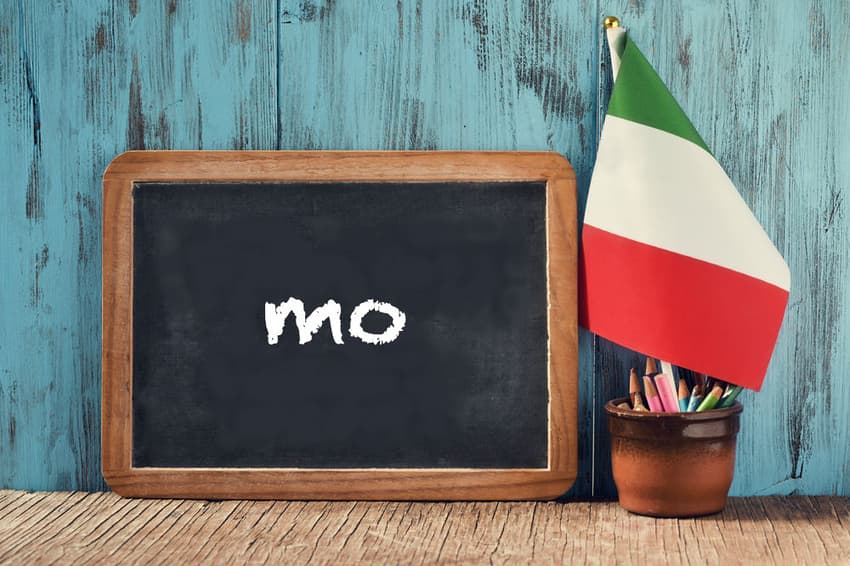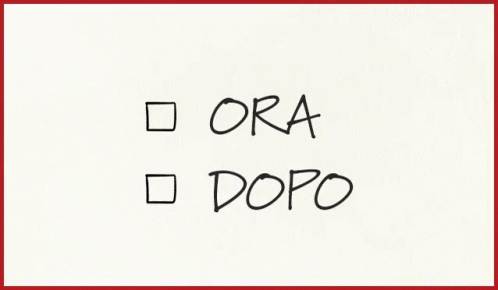Italian word of the day: 'Mo'

Plenty of Italians would argue that this word is not, in fact, Italian. You won't find it in every Italian dictionary and north of a certain latitude you're unlikely to hear it at all.
But on the streets of Rome and other parts of Italy's centre-south, mo is as common as ora or adesso, the two "proper" Italian words for the same thing: 'now'.
Mo che facciamo?
What shall we do now?
Mo sto studiando, però dopo vengo.
I'm studying right now, but I'll come later.

It's pronounced "moh", and written with or without a final apostrophe: mo or mo'. Though it's the kind of word you use when you're speaking Italian far more than when you're writing it.
But anyone who thinks mo is just slang should take a look at the word's etymology: it has classical credentials, deriving most likely from one of two Latin words, modo ('just now') or mox ('then', 'soon afterwards').
And it was deemed fit for poetry by none other than Dante Alighieri, the father of modern Italian, who uses it repeatedly in his Divine Comedy. Canto 8 of Purgatorio, for instance, includes the lines:
Verdi come fogliette pur mo nate
erano in veste...
Green as the little leaflets just now born
Their garments were...
As Dante demonstrates, mo doesn't only refer to the present but also to the (very) recent past – like 'just now' or 'a moment ago'.
L'ho visto mo, il tuo messaggio.
I just saw your message a moment ago.
But mo can also refer to a future so close it's practically the present – like 'immediately' or 'right this minute'. That's especially the case when you repeat it for emphasis.
Dammelo! Mo mo!
Give it to me, right this minute!
You can even combine mo with other words for 'now' for a similar effect: for instance adesso mo, ora mo, or mo ora.
If that doesn't seem to make much sense, we should warn you that you'll often hear mo as a sort of filler word that doesn't mean much on its own – a bit like 'right' or 'well' in English.
This famous line from the 1980s time travel comedy Non Ci Resta Che Piangere ('Nothing Left to Do But Cry') should give you an idea: warned by a priest that he will one day die, actor Massimo Troisi replies: "Mo, me lo segno" – "well, I'll make a note of that".
Do you have a favourite Italian word you'd like us to feature? If so, please email our editor Jessica Phelan with your suggestion.
Comments
See Also
You won't find it in every Italian dictionary and north of a certain latitude you're unlikely to hear it at all.
But on the streets of Rome and other parts of Italy's centre-south, mo is as common as ora or adesso, the two "proper" Italian words for the same thing: 'now'.
Mo che facciamo?
What shall we do now?
Mo sto studiando, però dopo vengo.
I'm studying right now, but I'll come later.

It's pronounced "moh", and written with or without a final apostrophe: mo or mo'. Though it's the kind of word you use when you're speaking Italian far more than when you're writing it.
But anyone who thinks mo is just slang should take a look at the word's etymology: it has classical credentials, deriving most likely from one of two Latin words, modo ('just now') or mox ('then', 'soon afterwards').
And it was deemed fit for poetry by none other than Dante Alighieri, the father of modern Italian, who uses it repeatedly in his Divine Comedy. Canto 8 of Purgatorio, for instance, includes the lines:
Verdi come fogliette pur mo nate
erano in veste...
Green as the little leaflets just now born
Their garments were...
As Dante demonstrates, mo doesn't only refer to the present but also to the (very) recent past – like 'just now' or 'a moment ago'.
L'ho visto mo, il tuo messaggio.
I just saw your message a moment ago.
But mo can also refer to a future so close it's practically the present – like 'immediately' or 'right this minute'. That's especially the case when you repeat it for emphasis.
Dammelo! Mo mo!
Give it to me, right this minute!
You can even combine mo with other words for 'now' for a similar effect: for instance adesso mo, ora mo, or mo ora.
If that doesn't seem to make much sense, we should warn you that you'll often hear mo as a sort of filler word that doesn't mean much on its own – a bit like 'right' or 'well' in English.
This famous line from the 1980s time travel comedy Non Ci Resta Che Piangere ('Nothing Left to Do But Cry') should give you an idea: warned by a priest that he will one day die, actor Massimo Troisi replies: "Mo, me lo segno" – "well, I'll make a note of that".
Do you have a favourite Italian word you'd like us to feature? If so, please email our editor Jessica Phelan with your suggestion.

Join the conversation in our comments section below. Share your own views and experience and if you have a question or suggestion for our journalists then email us at [email protected].
Please keep comments civil, constructive and on topic – and make sure to read our terms of use before getting involved.
Please log in here to leave a comment.